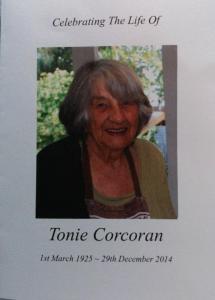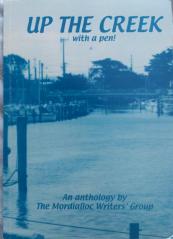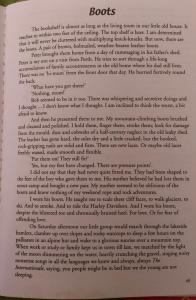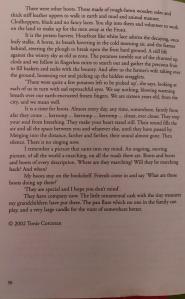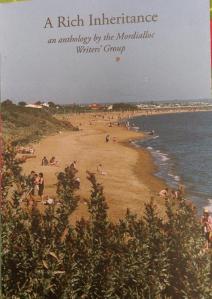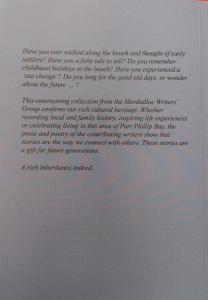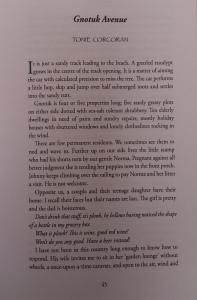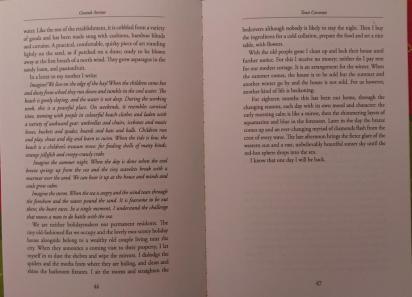
I love this picture of my husband, John with daughter, Anne. In 1986, he may have been the Secretary of one of the largest and most powerful trade unions in Australia but he was also a new father, albeit second time round.
And the second time around he had his priorities right. Whenever he came home, or if I met him after work, he switched off, and lived in the moment – moments of love and joy, concentrating on family and where and how we fitted into the big picture of Life.
This week is the anniversary of John’s death and as usual reflection and memories of our time together are more intense but I’m always grateful for the many gifts John left me. The most important of course being our two beautiful daughters, but also his wisdom about taking the time to value what is really important in life:
- the respect and love of those you hold dear,
- the difference you make in their lives,
- and the legacy you leave for them.
Begone Stress!
“I find it makes life a lot easier if you just forget a lot of stuff you’re supposed to be doing.”
JK Rowling

We never took advantage of the perk of having our home telephone paid even although many times calls were work-related. We chose to have a silent number, more expensive but unlisted in the telephone directory. This helped to separate home and work, especially random calls from the media, plus abusive calls and death threats – although unfortunately some of the latter got through.
It wasn’t a perfect system but a thousand times better than today’s mobile world where everyone is urged to be contactable regardless of where they are – the flexibility to work marketed as a plus, feeding the idea that we are indispensable and therefore don’t switch off. Add the 24-hour news cycle and social media platforms like FB and Twitter and in some cases, it is a perfect storm for anxiety and overwork.
I dread to think how different some of the tough periods we experienced could have been in today’s world. It is a brave person who puts their hand up for a job requiring time in the public eye.
A child pretending to talk into a phone has become children as young as pre-schoolers actually having a proliferation of digital tools for entertainment, including computers, game consoles, phones, and iPads.
Childhood a different experience than when my daughters were young. I’m not sure if many modern children learn how to switch off or disconnect. This may be a contributing factor to the high rates of anxiety and depression we hear about.

I must factor in a proper break – I know a failure to do this has consequences – my body tells me that in no uncertain terms. In the last few weeks, I’ve experienced the extreme effects of a bout of labyrinthitis – not the ideal way to slow down but the illness leave you no option.
Holiday Games
In my healthy world, there are lots of books to read and word and writing games to help me slow down and relax, as well as a variety of craft which I enjoy.
I have a Scrabble buddy, Helen, and the girls and I enjoy board games like Cluedo (we have various boutique variations) but my all-time favourite is Sequence ( a combination of cards and poker chips). I also love crossword puzzles and now use these as a preferred way of switching my mind off to drift into sleep.
By the time term ends, I figure everyone is looking to wind down and have some fun so I step out of the normal lesson structure and encourage free-fall writing and see what eventuates.
America has produced innovative writing teachers along with amazing writers. We may bemoan the changes they have made to English spelling and grammar but there is no denying they have also enriched the English language and culture. The best writing games I have come from the USA.

I have several games I’ve bought online but also a couple that I’ve discovered in Melbourne shops. Serendipitous finds that I share with my writing group or classes.
Memories of Mordialloc Writer’s Group’s traditional Christmas get-together before the summer break still makes me chuckle as I recall the weird, wacky and wonderful stories produced.
In many of my end of term classes, it is the same.
Outrageous first lines, off-the-planet characters, ridiculous plots, absurd settings – a toss of the dice or a random choice that forces you out of your comfort zone. Pushes you in directions not attempted before.
Permission to be fanciful, funny, and free of being politically correct, or following accepted structures and expectations.

Amazingly, a gem may be produced, an idea salvaged to be usable or a memorable entertaining story to remind us how wonderful manipulating words can be.
We’ve been told often enough there are only seven basic plots, seven archetypal themes recurring through every kind of storytelling whether ancient myths, folk tales, plays, short stories, novels, movies or TV soap operas:
- Overcoming the Monster
- Rags to Riches
- The Quest
- Voyage and Return
- Comedy
- Tragedy
- Rebirth
We also know the hero has a thousand faces and we must always be at war against cliché!
However, for a few minutes, in my last classes for the term, we race against time, let all the rules and tools of crafting fiction we’ve absorbed loose, and have some fun – stereotypes and clichés abound or may disappear.
Mid 19th century: French, past participle (used as a noun) of clichér ‘to stereotype’.
They are very similar. A stereotype is a generalization, it’s usually considered negative, and is oversimplified. Oxford uses “the woman as the carer” as their example of a stereotype. Not all women are “carers” so it is a stereotype. A cliché is any word, phrase, situation, or idea that has become so popular it is tired and overused. It can be a stereotype, but it can also be a fact. Popular phrases can be cliché, a stereotype can be a cliché or even common things in poetry can become a cliché, like the very overused “babbling brook” “pouring rain” or “everlasting love.”
The Writer’s Toolbox
This term, we used The Writer’s Toolbox, a game I picked up in Readings, St Kilda, for a mere $14.95 last September. A bargain I’m still crowing about.

A box of fun guaranteed to banish stress and clear writer’s block – and to paraphrase Star Trek – your imagination travels where you’ve never been before!
We didn’t have time to use the game to its full extent because lessons are finite but I cherry-picked parts so we had the opportunity to share everyone’s delightful masterpieces.
We also bent the rules – some managed to use every prompt they were given, others used some and others altered their lines or words to suit their story. That’s what is wonderful about writing games – the only rules are imagination and that moving pen!

I’ve listed my prompts and the bizarre flash fiction result follows.
First sentence: (To start with a surprise) My brother did this weird thing with turtles…
NonSequitur: (a surprising transition) … that weekend in Duluth
The Last Straw: (to create a dramatic arc) … “We were drinking champagne and losing our shirts.”
Three Sixth-Sense cards: (reminders to include the senses) fresh floor wax; the toenails of the yoga girl; the smell of Susie’s leftovers
FLASH FICTION IN 30 MINUTES
Fijian Fantasy by Mairi Neil (590 words)
My brother did this weird thing with turtles when he was drinking. I’m not talking tea or coffee, of course, but the hard stuff. Straight whisky – shots Jack called them.
After a few shots, he’d balance the turtle on his head, sway forwards so the turtle slid down his neck, disappeared into his ghastly, fluorescent shirt, and I don’t know how, because they’re the slowest creatures I know, but the darn thing popped out the front of his shirt the minute he straightened up – much to the surprise and applause of the audience.
Jack wasn’t on a stage, of course, but in a bar. Any bar, makeshift or otherwise. One of many found in the Fijian Islands where he’s lived for the past eighteen years. Needless to say, his audiences all mad or as drunk as him. It wasn’t the life our conservative parents envisaged and they clung to a belief Jack would, as father often said, ‘grow up and get a real job.’
But tropical sunsets and island life suits Jack and he can sing too. He’s made a precarious living entertaining the tourists with his weird turtle act and Frank Sinatra voice – until that weekend in Duluth.
Duluth, outback Australia, the most boring place on earth, but where my parents decided to retire and request brother Jack and I turn up for their 50th wedding anniversary celebration.
When Jack received the invitation, he said it was more of a royal command and spoiled the promise of the best relationship of his life. ‘We’re drinking champagne and losing our shirts,’ he boasted. ‘Susie’s teaching me yoga and my body’s discovering positions I never knew possible.’
‘Too much information, Jack!’ I said, ‘And you have to be here. Now get on a plane with shirt, minus turtle and be in Duluth by Tuesday.’
He never showed.
The oldies were devastated and I was despatched to Fiji to check Jack was okay. He’d fallen off the radar since our last conversation.
I arrived at his house, well shack really. (The smell of Susie’s leftovers still cling to my nostrils.) Jack told me she had a penchant for kippers and hash browns. Neither were clean freaks because the place looked like the aftermath of a hand grenade explosion. I doubt if Jack could find a shirt for turtle act or anything else among the piles of gaudy floral clothes. By the smell, they may even have taken root.
I discovered toenails of the yoga girl strewn like red confetti on the bathroom floor. I assume they were hers unless Jack kept more secrets from the oldies. My blood pressure rose along with my temper but as I turned to leave, I spied a scrap of rainbow-coloured paper fluttering on the fridge door.
‘When you’re ready to leave turtles and shots meet me at Hotel Marau‘
On arrival, at the swankiest hotel on the island, you’re assaulted by fresh floor wax, sparkling mirrors, polished mahogany tables, and an ambience of soft piano music, tinkling water fountains and slippered feet gliding on parquet tiles.
Jack’s dirty shambles existed on a different planet so I almost fainted to see him on stage, his dinner-suited elegance crooning a la Frank Sinatra.
A glamorous woman, oozing chiffon and bling, sat at the front table enthralled, red fingernails tapping a martini glass. Susie, the yoga girl?
A wedding ring glittered on her finger matching the one on Jack’s hand clutching the mic.
Duluth may not be amused but at least no turtles or shots in sight.
YOUR TURN NOW:
Here are a few examples of some of the First Line prompts. Find a quiet spot and see what your imagination produces.
- Your Mother lied to you, that’s the truth!
- I have this system for getting exactly what I want out of people.
- Dad gave me a wink like we were pals or something…
- I loved the way she said ‘balloon’…
- He swore on his mother’s grave but then he swore on just about everything.
- There I was just standing there…
- My only defence was to write down every word they said…
Happy Holidays!


























































